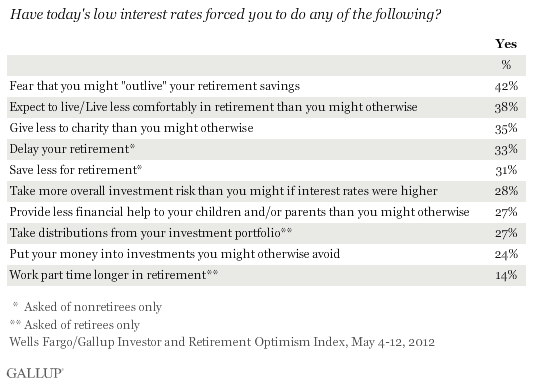Two in three investors (63%) say policymakers should take into account the harm low interest rates do to older Americans when they seek to keep interest rates low for an extended period of time, according to a Wells Fargo-Gallup Investor and Retirement Optimism Index poll. This point that investors are making is even more important now, because throwing more money at the U.S. economy right now may do the economy more harm than good. Taking potential costs and benefits into account, the Federal Open Market Committee (FOMC) may be wise to avoid new quantitative easing -- in any form -- at its June 19-20 meeting.
The most recent Wells Fargo/Gallup Index survey sought to assess the impact of extended low rates on American investors. Some of the findings are stunning:
- One in three investors say low rates have forced them to delay retirement. This suggests that low rates are indirectly putting additional pressure on the job market. It also raises questions about the idea that the U.S. labor force is shrinking due to an increase in voluntary retirements.
- Forty-two percent of investors say low rates make them fear they may "outlive" their retirement savings. As Americans' average life expectancy has increased, so has the need for a steady source of income over an extended period of time for retirees. Low rates make this more difficult, with 27% of investors saying as a result, they've been forced to take a principal distribution from their investment portfolio.
- Thirty-eight percent of investors say low rates will force them or are currently forcing them to live less comfortably in retirement. For many investors, comfort in retirement depends on what they can earn on their investment portfolio. In turn, artificially lower interest rates on relatively safe investments make it more difficult for investors to earn as much as they may have planned in the past -- when financial conditions were more normal.
Given the significant impact of low interest rates on retirees and on retirement planning, Federal Reserve Board Chairman Ben Bernanke and the FOMC may want to carefully weigh the potential benefits of flooding the U.S. financial system with additional funds. Today's already-low interest rates and the flight to quality during recent weeks due to concerns about the financial crisis in Europe suggest that the benefits of another quantitative easing in terms of stimulating economic growth may be limited.
More importantly, pouring more money into the economy may have the harmful impact of raising commodity prices on Main Street. For example, after the poor jobs report on Friday June 1, oil prices tumbled and prospects for a continued drop in gas prices seemed likely. However in the days that followed, talk of another round of quantitative easing on Wall Street seemed to have commodity prices reversing course.
In sum, the potential net benefits of additional quantitative easing seem to be minimal, at best. At the same time, low interest rates continue to harm many older Americans. It may not be time to reverse the course of interest rates and allow them to return to something approximating normal, but neither does it seem appropriate for policymakers to flood the economy with money -- barring another financial crisis.

